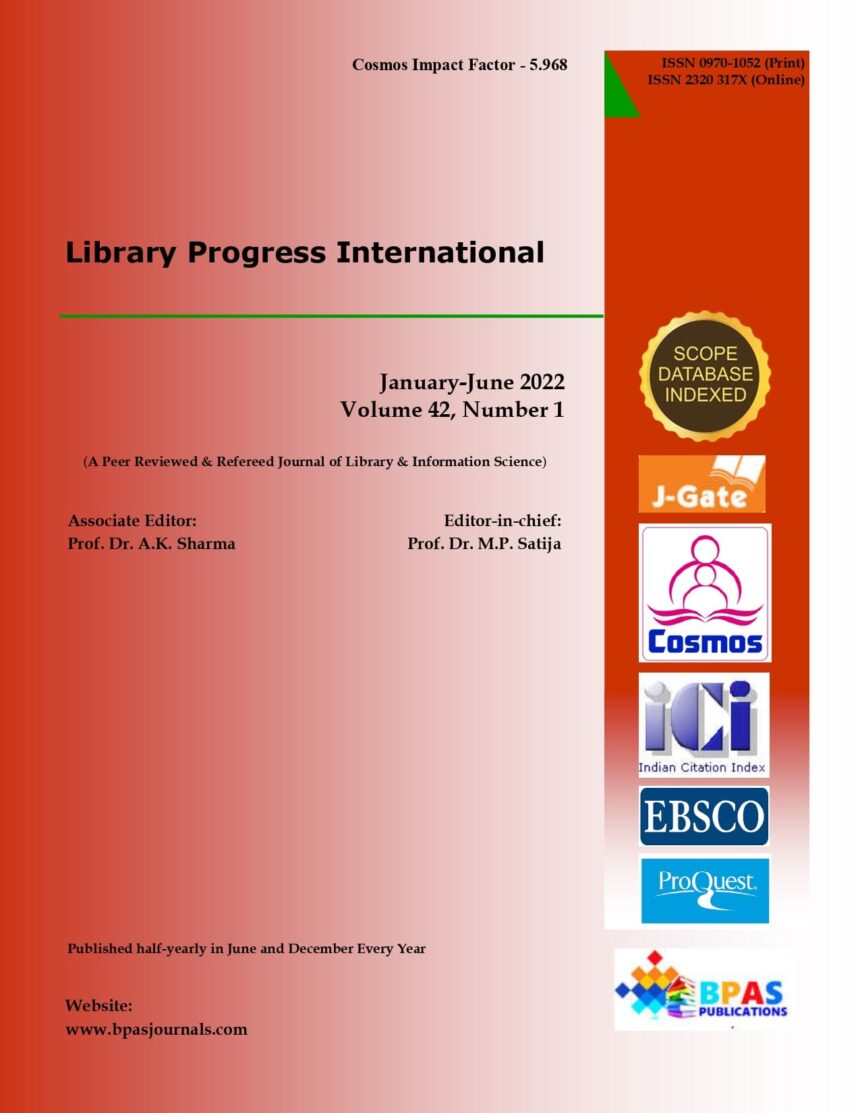Use of Electronic Information Resources among undergraduates in Selected Private Universities: A Case Study
DOI:
https://doi.org/10.48165/Keywords:
Electronic Information Resources (EIRs), Use of EIRs, Challenges to EIRs, Private universities, Purpose of EIRs, UndergraduatesAbstract
Aims: The study examined the use of Electronic Information Resources with particular reference to frequency, purposes and challenges. Design/Method: The descriptive survey research design was adopted for this study. The population of the study comprises 3,665 students across the six and four faculties of Ajayi Crowther University and Lead City University respectively, both located in the Oyo State of Nigeria. Simple random sampling technique was employed and 10%sampling fraction from each faculty was used to ascertain the sample size for the study, which yielded 367 undergraduates. Questionnaire was used to elicit data from the respondents. Out of the 367 copies of questionnaire administered, 352 copies were returned and found useful for analysis, giving a response rate of 96%. Statistical Analysis: The data was subjected to descriptive analysis of percentage, mean and standard deviation.Results: The results revealed that the undergraduates’ frequency of electronic information resources use was slightly high and such use was for both academic and non-academic purposes. The challenges faced by most of the undergraduates in the two universities when using electronic information resources were Internet connection/network problems, frustration of finding too much information, interrupted power supply and limitations in the use of keywords to search. Conclusion: The study concluded that electronic information resources play a crucial role in meeting the information needs of undergraduates and for their overall development.
Downloads
References
Adeleke, D. S. & Nwalo, K. I. N. (2017). Availability, use and constraints to use of electronic information resources by postgraduates students at the University of Ibadan. International Journal of Knowledge Content Development and Technology, 7(4), 51- 69. Retrieved from https://doi.org/10.5865/IJKCT.2017.7.4.051
Ajayi, S. A., Shorunke, O. A., & Aboyade, M. A. (2014). The influence of electronic resources on students‟ reading culture in Nigerian universities. A case study of Adeleke University, Ede, Osun state. Library Philosophy and Practice. Retrieved from https://digitalcommons.unl.edu/libphilpra
c/1182/
Daramola, C. F. (2016). Perception and utilization of electronic resources by undergraduate students: The case of the Federal University of Technology Library, Akure. American Journal of Educational Research, 4(5), 366-370. Retrieved from http://article.scieducationalresearch.com/p
df/EDUCATION-4-5-1.pdf
Dhanavandan, S. & Tamizhchelvan, M. (2012). An evaluation of E-resources in academic libraries in Tamil Nadu. Journal of
Emerging Trends in Computing and Information Sciences, 3(3), 421. Retrieved from
http://citeseerx.ist.psu.edu/messages/dow nloadsexceeded.html Egberongbe, H. S. (2011). The use and impact of electronic resources at the University of Lagos. Library Philosophy and Practice (e-journal). Retrieved
https://digitalcommons.unl.edu/libphilpra c/472/
Fyneman, B., Idiedo, V.O., & Ebhomeya, L. (2014). Use of e-resources by undergraduates in two selected universities in the Niger Delta region of Nigeria. Journal of Information and Knowledge Management, 5(2), 170-186. Retrieved from https://www.ajol.info/index.php/iijikm/a
rticle/view/144655 Head, A.J. &
Eisenberg, M.B. (2010). Truth be told. How college students evaluate and use information in the digital age. Project information literacy progress report. Mac Arthur Foundation. Retrieved from https://projectinfolit.org/pubs/evaluating
information-study/pil_evaluating
information_2010-11-01.pdf
Ivwighreghweta, O. & Igere, M. A. (2014). Impact of the Internet on academic performance of students tertiary institutions in Nigeria. Journal of Information and Knowledge Management, 5(2), 47-56. Retrieved from https://www.ajol.info/index.php/iijikm/a
rticle/view/144636
Kwadzo, G. (2015). Awareness and usage of electronic databses by Geography and Resources Development information studies graduate students in the University of Ghana. Library Philophy and Practice. Retrieved from https://digitalcommons.unl.edu/libphilpra
c/1210/
Madondo, T. Sithole, N., & Chisita, C. (2017). Use of electronic information resources by undergraduates students in the faculty of management and administration at Africa University, Mutare, Zimbabwe. Asian Research Journal of Arts and Social Sciences, 2(2), 1-12. Retrieved from https://doi.org/10.9734/ARJASS/2017/296
Ndubuisi, C. J., & Udo, N. (2013). Empirical
study of motivation, challenges and strategies in the use of electronic information resources by postgraduate library users in South- east Nigerian Federal Universities. International Journal of Library and Information Science, 5(11), 468-473. Retrieved from https://academicjournals.org/article/articl
e1389349323_Ndubuisi%20and%20Udo.pdf 11. Oduro-Anane. (2016). Use of electronic databases by final year students of the University of Ghana College of health science. Masters thesis, Department of Information Science, University of Pretoria. Retrieved from https://repository.up.ac.za/bitstream/han dle/2263/55837/OduroAnane_Use_2016.pd f?sequence=3&isAllowed=y
Okiki, O. & Asiru, S. (2011). Use of electronic information sources by postgraduate students in Nigeria: Influencing factors. Library Philosophy and Practice (e-journal) Retrieved from https://digitalcommons.unl.edu/libphilpra
c/500/
Owolabi, S., Idowu, O., Okocha, F., & Ogundare, A. (2016). Utilization of electronic information resources by undergraduate students of University of Ibadan: A Case Study of Social Sciences and Education. Journal of Education and Practice,
(13), 30-36. Retrieved from https://files.eric.ed.gov/fulltext/EJ1102819 .pdf
Tariq, H. & Zia, M. W. (2014). Use of electronic information resources by the students of Faculty of Science, University Of Karachi. International Journal of Digital Library Services, 4(3), 80-91. Retrieved from http://www.ijodls.in/uploads/3/6/0/3/36
/8434.pdf
Tekale, R. & Dalve, D. B. (2012). E-resources review of research. Retrieved from https://reviewofsearch.net/publisharticles /45.pdf
Thanuskodi, S. (2012). Use of e-resources by the students and researchers of faculty of Arts, Annamalai University. Retrieved from http://article.sapub.org/10.5923.j.library.20 120101.01.html
Togia, A. & Tsigilis, N. (2009). Awareness and use of electronic information resources
results from Aristotle University of Thessaloniki. Paper presented at the International Conference on Qualitative and Quantitative Methodsin Libraries, 464-472. Retrieved from
https://doi.org/10.1142/9789814299701_00 58
Tyagi, S. (2011). Use and awareness of electronic resources at IIT Roorkee, India: A case study. JLIS.it, 2:1, 4586-1- 4586-20
Wijetunje, P. (2014). Digital information resource preferences of undergraduates with special reference to faculties of Agriculture, Arts, Engineering and Science of the University of Peradeniya, Sri Lanka. Proceedings of the Peradeniya Univesity International Research Sessions (iPURSE 2014), Vol. 18, July 4 & 5. 18. Retrieved from http://www.dlib.pdn.ac.lk/archive/handle
/4605

